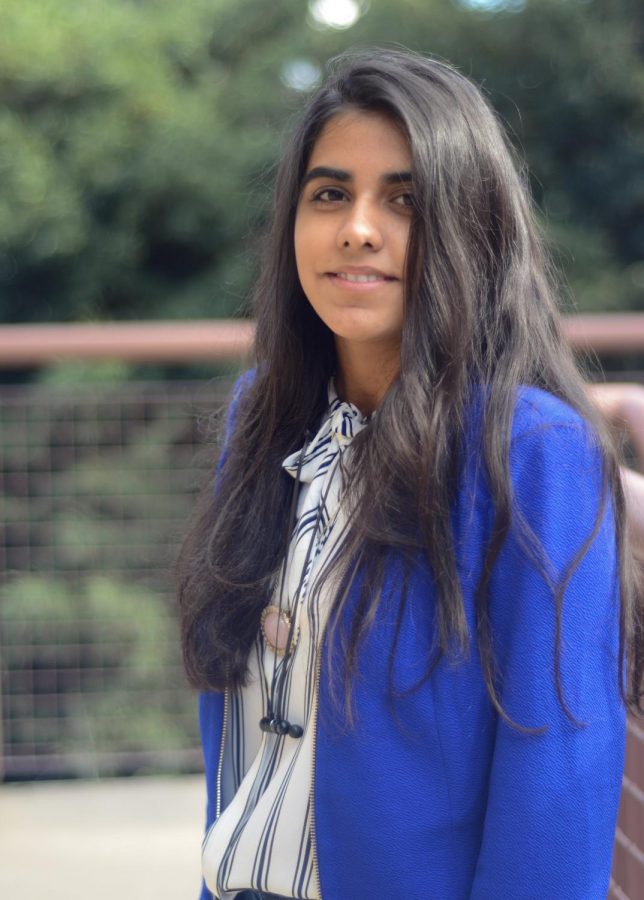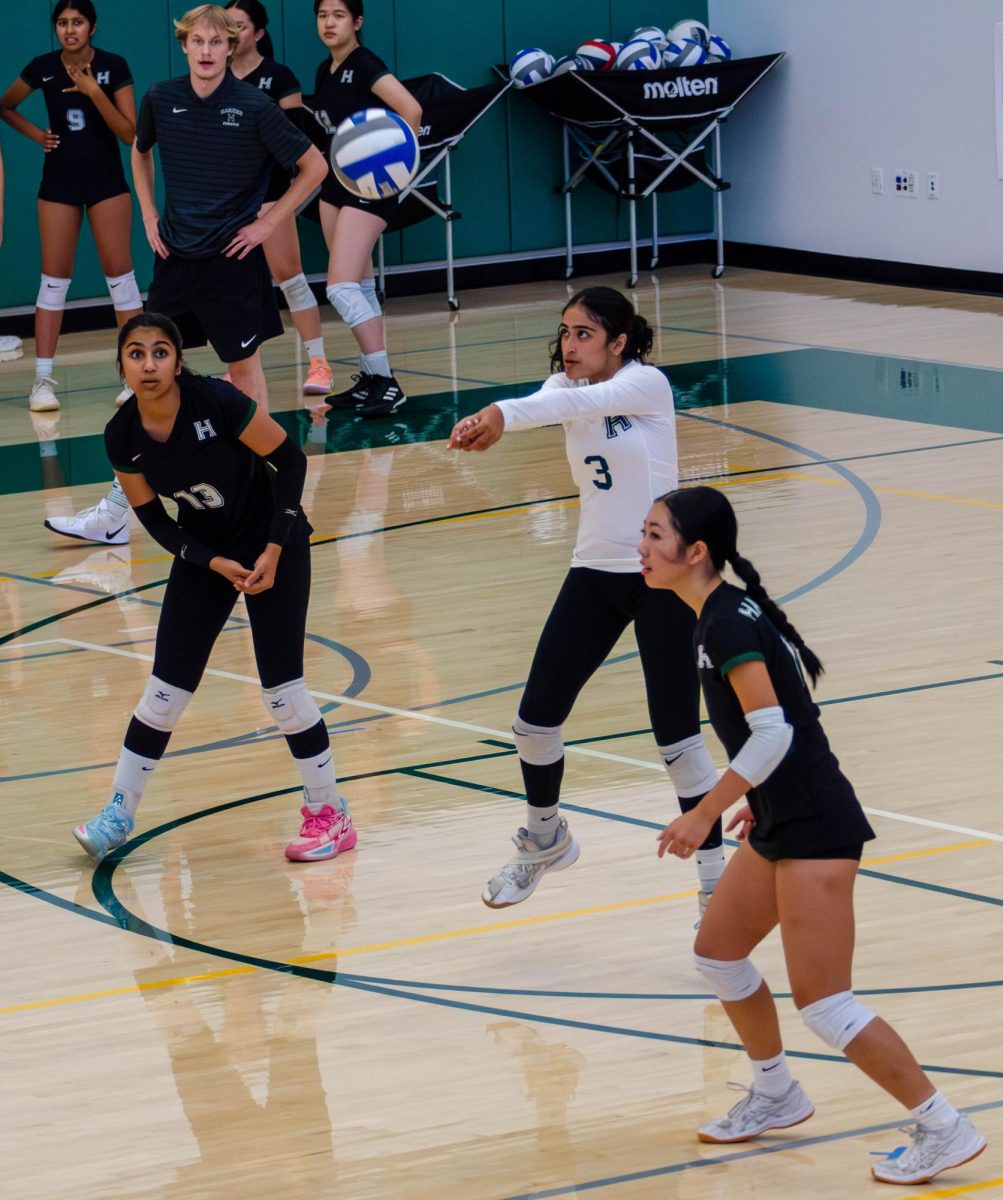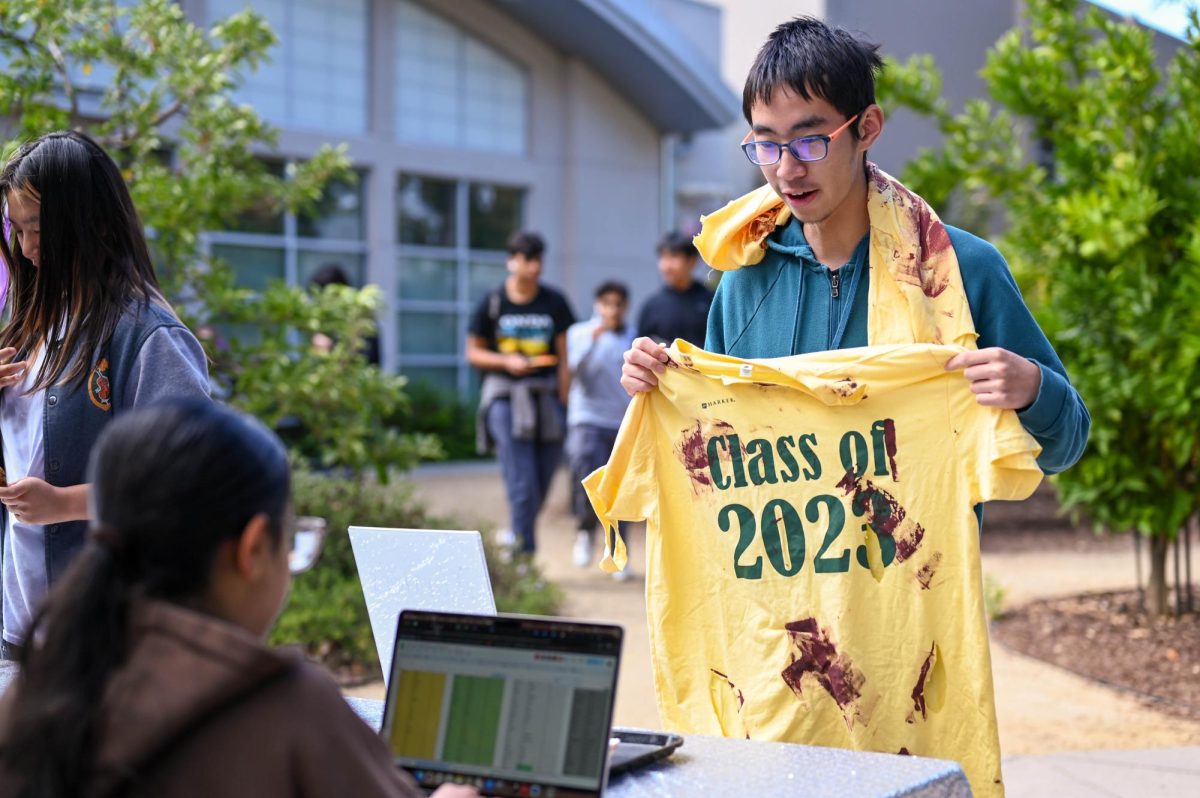Humans of Harker: Aliesa Bahri breaks down barriers
Nilisha Baid
“When I got to high school, I was trying to get into these honors classes because I felt that by being in these higher level classes, I would be validated,” Aliesa Bahri (12) said. “It was really difficult my freshman year to meet the requirements, but I did, and I moved up in all my classes. When I got there, that barrier that I felt between me and everyone else was still there, and I couldn’t get rid of it. It was only when I started to ignore it and to stop comparing myself to other people, which I had been doing unintentionally, and to focus on who I am and what I wanted did that barrier disappear completely. Only by trying not to tackle it did I actually let it disappear.”
January 22, 2018
The balcony behind Nichols is often empty, silent aside from the roaring of the freeway. To Aliesa Bahri (12), it’s an island of tranquility in the bustling school, where she can relax and reflect on herself.
“Watching the highway, seeing everyone with things to do and places to be, makes all my problems seem small because it reminds me of all the incredible things that are waiting out there,” she said.
From walking a mile across Washington, D.C. as an eighth grader to bungee jumping in Costa Rica, Aliesa find joy in spontaneity. But despite her love for adventure, she also sees the importance of being prepared: planning has helped her maintain control over her life.
“I would say that whenever there’s something that comes up that I’m afraid about, I just think, what can I do to prepare for this the best, and if there isn’t a way to prepare at all, I just have to believe in my capacity to recover from whatever mistakes I make,” Aliesa said. “That is the thing that has always calmed me down.”
Jai Bahri (10), one of Aliesa’s four brothers, praised her work ethic and independent spirit.
“She’s very self-motivated and hardworking,” he said. “She tries to do things by herself. Even when our parents try to help her, she will make sure that she does it. Actually, if they interfere, she tells them off, so she’s very independent that way. She doesn’t take help from anyone, but I think that’s actually a good thing in her. That enables her to find an intrinsic drive to actually do things.”
But Aliesa hasn’t always had confidence in her abilities. After joining Harker in kindergarten, Aliesa found herself in the lowest levels of her classes throughout lower and middle school. However, upon reaching high school, she realized that she had the opportunity to change.
“I always felt like there was this intellectual boundary between me and the rest of my peers that I couldn’t surpass because I was intrinsically intellectually inferior,” Aliesa said. “I never gave the material that I learned in class the chance to appeal to me. I never strove to surpass my limitations because I felt like, ‘This is who I am; I can’t get better; it’s just genetically impossible.’”
The barrier she had always seen between her and others continued to exist even into high school.
“When I got to high school, I was trying to get into these honors classes because I felt that by being in these higher level classes, I would be validated,” she said. “It was really difficult my freshman year to meet the requirements, but I did, and I moved up in all my classes. When I got there, that barrier that I felt between me and everyone else was still there, and I couldn’t get rid of it. It was only when I started to ignore it and to stop comparing myself to other people, which I had been doing unintentionally, and to focus on who I am and what I wanted did that barrier disappear completely. Only by trying not to tackle it did I actually let it disappear.”
Damon Halback, Aliesa’s AP US History and Modern International Affairs teacher, supported her by encouraging her to share her activism with her classmates. Occasionally, he even excused her from class when she needed to conference call with the state senator’s staff.
“She’s able to leverage what she learns in school and leverage that to try and make actual changes for people,” Halback said. “One of her strengths is that she sees the power to make a change even though she’s still so young, and that’s a really unique way of acting on what you’ve learned.”
Despite the weight of the issues she usually tackles, Aliesa also sees merit in more minor contributions towards the common good.
“Even if it’s really small, like a really tiny act of compassion, that’s all I want to be in the minds of others,” she said. “It’s nothing super huge; it’s more just holding the door open for someone or giving someone a piece of friendly advice or bringing someone a drink from Starbucks when you know they’re having a really bad day. It’s just small ways of making other people’s lives better, and I think that that’s something everyone practices; I mean, it’s human nature to be compassionate to other people, but I think compassion can also be a habit. When you make certain traits a habit in your life, you finally understand their significance.”


















![“[Building nerf blasters] became this outlet of creativity for me that hasn't been matched by anything else. The process [of] making a build complete to your desire is such a painstakingly difficult process, but I've had to learn from [the skills needed from] soldering to proper painting. There's so many different options for everything, if you think about it, it exists. The best part is [that] if it doesn't exist, you can build it yourself," Ishaan Parate said.](https://harkeraquila.com/wp-content/uploads/2022/08/DSC_8149-900x604.jpg)




![“When I came into high school, I was ready to be a follower. But DECA was a game changer for me. It helped me overcome my fear of public speaking, and it's played such a major role in who I've become today. To be able to successfully lead a chapter of 150 students, an officer team and be one of the upperclassmen I once really admired is something I'm [really] proud of,” Anvitha Tummala ('21) said.](https://harkeraquila.com/wp-content/uploads/2021/07/Screen-Shot-2021-07-25-at-9.50.05-AM-900x594.png)







![“I think getting up in the morning and having a sense of purpose [is exciting]. I think without a certain amount of drive, life is kind of obsolete and mundane, and I think having that every single day is what makes each day unique and kind of makes life exciting,” Neymika Jain (12) said.](https://harkeraquila.com/wp-content/uploads/2017/06/Screen-Shot-2017-06-03-at-4.54.16-PM.png)








![“My slogan is ‘slow feet, don’t eat, and I’m hungry.’ You need to run fast to get where you are–you aren't going to get those championships if you aren't fast,” Angel Cervantes (12) said. “I want to do well in school on my tests and in track and win championships for my team. I live by that, [and] I can do that anywhere: in the classroom or on the field.”](https://harkeraquila.com/wp-content/uploads/2018/06/DSC5146-900x601.jpg)
![“[Volleyball has] taught me how to fall correctly, and another thing it taught is that you don’t have to be the best at something to be good at it. If you just hit the ball in a smart way, then it still scores points and you’re good at it. You could be a background player and still make a much bigger impact on the team than you would think,” Anya Gert (’20) said.](https://harkeraquila.com/wp-content/uploads/2020/06/AnnaGert_JinTuan_HoHPhotoEdited-600x900.jpeg)

![“I'm not nearly there yet, but [my confidence has] definitely been getting better since I was pretty shy and timid coming into Harker my freshman year. I know that there's a lot of people that are really confident in what they do, and I really admire them. Everyone's so driven and that has really pushed me to kind of try to find my own place in high school and be more confident,” Alyssa Huang (’20) said.](https://harkeraquila.com/wp-content/uploads/2020/06/AlyssaHuang_EmilyChen_HoHPhoto-900x749.jpeg)










